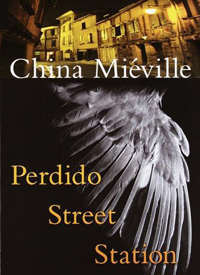
Macmillan
I've written in this space before about the problem authors face in building convincing fantasy worlds: do they fill in all the details and treat them as holy writ, indisputable and unexpandable, though perhaps up for interpretation? Do they provide a framework that allows for and encourages fans, professional and otherwise, to fill in holes, extend the timeframe, to illuminate unwritten backstories of minor characters? But as an extension of that thinking, I've also been struggling with how, within the larger fictional universes authors create, how they decide to explain, or not explain, how fantastical concepts, be they wizarding magic or crisis energy, work.
I've been considering this because I'm reading China Mieville's
Perdido Street Station as
part of a book club, and I picked up Marion Zimmer Bradley's
The Mists of Avalon again as a contrast and palate-cleanser. They take considerably different approaches to their fantastical elements—in Mieville's case a blend of physics and magic, in Bradley's case, a combination of magic and religion.
Mieville goes for a full-explanation route, giving his main character, Isaac, long passages of scientific exposition that kind of make sense if you've remembered your high school classes. The language acts more as a trigger, it's a simulacra that lulls you into thinking Isaac's theories make sense, even though they're not fully explicable and certainly aren't remotely verifiable. Zimmer Bradley, whose world construction is actually far more complete than Mieville's is, in part because she's drawing on established myth and real geography (always handy things to have in your tool kit, if you're aiming for plausibility and immersiveness), but she actually gives us less explanation for magic than Mieville does of his science. Some knowledge is biological and explicable in her universe, but other things are clearly stated as mysteries: as non-initiates, we are simply not permitted to know how certain events occur, or how certain powers work.
Fantasy and science fiction almost always (I say almost, because some hard sci-fi is an exception) require us to make that leap, to accept, if not to believe, something that is not at all possible in our current universe. I don't know that there's one method that's more effective than another in making that leap, it's really all in execution. Zimmer Bradley's very, very good at writing in a way that establishes a deep sense of respect for the deities in her readers, so it's easier to accept--and regret, even--that we are not initiates into mysteries unavailable to us. Scientific patter, if it's too advanced for us, can lead us to tune out what's meant to be a lulling flow of words and explanations, or if it's too patently false, can encourage us to poke holes in the veil being thrown over us. Spells are hard to cast, even when you're only drawing on a keyboard and your own mind to do it.
